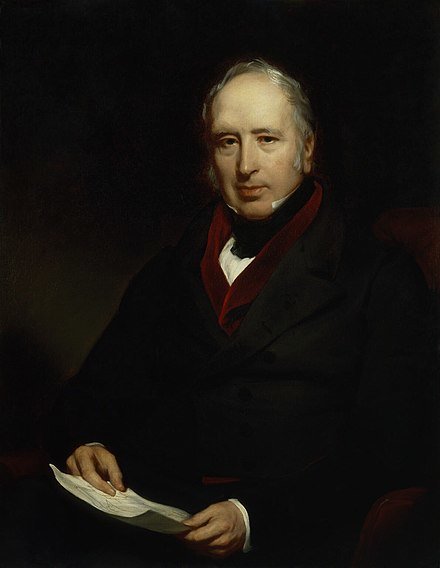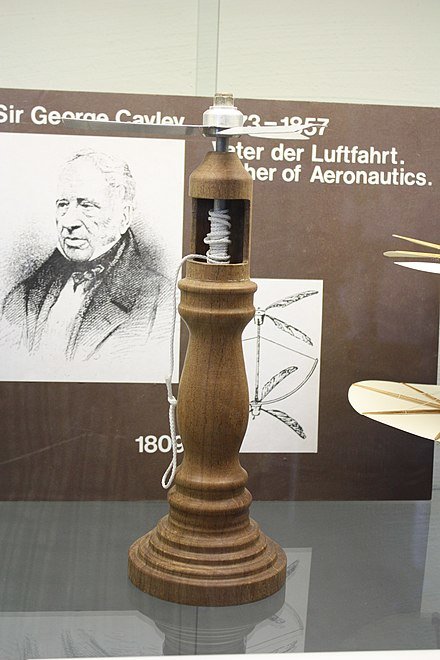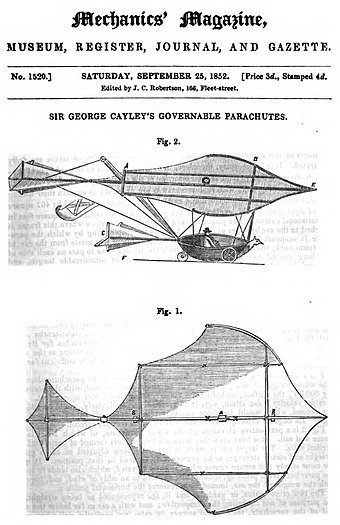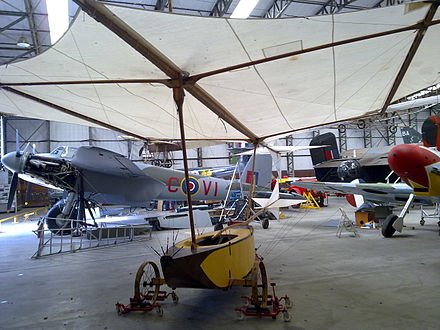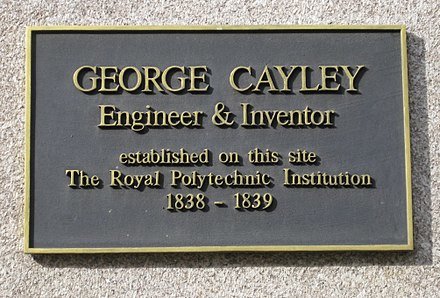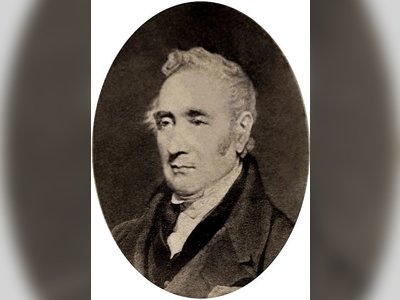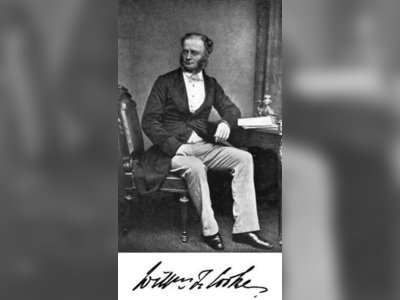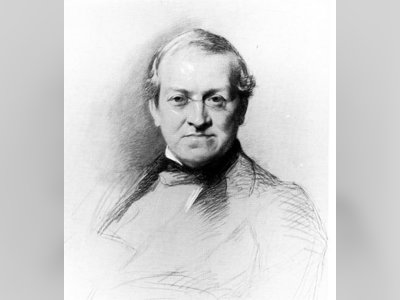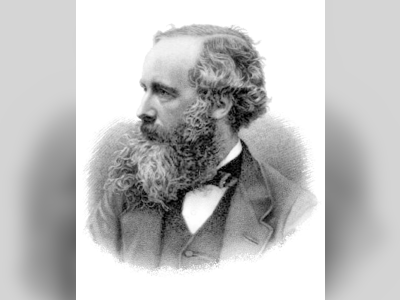British Heritage
Remember, Cherish, Learn.
beta
George Cayley - The "Father of Aviation" 1799
The Foundational Pillar of British Aviation Heritage.
From inventing the concept of the modern aeroplane to founding the UK's first Polytechnic Institute, Sir George Cayley's contributions to British heritage are profound and far-reaching. His seminal work and ground-breaking innovations in aeronautical engineering have not only cemented his position as the "Father of Aviation" but also shaped the course of scientific and technological advancements in Britain.
Born on 27th December 1773, Sir George Cayley, the 6th Baronet, was an extraordinary English engineer, inventor, and aviator. He is indisputably one of the key figures in the annals of aeronautical history. His contributions were revolutionary, making him the pioneer scientific aerial investigator and the first to comprehend the fundamental principles and forces of flight.
In the dawn of the 19th century, specifically in 1799, Cayley conceived the notion of the modern aeroplane. He postulated the idea of a fixed-wing flying machine, complete with independent systems for lift, propulsion, and control. His work laid the cornerstone for modern aviation, pioneering the understanding of the four essential forces influencing a heavier-than-air flying vehicle: weight, lift, drag, and thrust.
In addition to his insights on the foundational forces of flight, Cayley is credited with the invention of the first flying model aeroplane and the construction of the first glider known to carry a human aloft. He proposed the importance of cambered wings, a principle central to modern aeroplane design. Notably, he foresaw that sustained flight would only be possible with a lightweight engine that could generate adequate thrust and lift - an anticipation that was affirmed with the advent of the Wright brothers' flight.
Cayley's contributions were not confined to aviation alone; he was a noteworthy figure in British politics and education as well. Representing the Whig party, he served as the Member of Parliament for Scarborough from 1832 to 1835. His influence expanded into the realm of education when, in 1838, he assisted in the establishment of the UK's first Polytechnic Institute, the Royal Polytechnic Institution, now known as the University of Westminster. He also held the prestigious position of Vice-President of the Yorkshire Philosophical Society in 1824 and was a founding member of the British Association for the Advancement of Science.
Cayley was a polymath who involved himself in various engineering ventures. His wide array of inventions ranged from self-righting lifeboats, tension-spoke wheels, and the "Universal Railway" to automatic signals for railway crossings, small-scale helicopters, and a prototypical internal combustion engine fuelled by gunpowder. Cayley's ingenuity also extended to theoretical concepts. He proposed the possibility of engines operating on gaseous vapours, a concept that foreshadowed the emergence of the modern internal combustion engine. Moreover, his contributions in the fields of prosthetics, air engines, electricity, theatre architecture, ballistics, optics, and land reclamation reflected his innovative genius.
His pioneering efforts in aviation led to the development of an efficient cambered airfoil and identified the four forces that influence an aircraft. Cayley invented a new method of constructing lightweight wheels that are widely used today. His 1853 glider, flown across Brompton Dale, paved the way for the era of human flight. Furthermore, his conceptual model of a convertiplane in 1843 laid the foundation for modern vertical takeoff and landing aircraft.
Cayley's legacy is deeply ingrained in British history, and his contributions are honoured in numerous ways. His name adorns halls of residence and teaching buildings at the University of Hull, Scarborough Campus and Loughborough University. He is also commemorated with a gold plaque at the entrance of the Regent Street building of the University of Westminster, recognising his foundational role in the institution's establishment.
His impact is also recognised at the Royal Air Force Museum London in Hendon and the Yorkshire Air Museum, Elvington, York, both featuring exhibits honouring Cayley's achievements and a modern exhibition and film titled "Pioneers of Aviation." The Sir George Cayley Sailwing Club, a Yorkshire-based free flight club established in 1975, continues to bear his name, celebrating his pioneering contributions to aviation.
Inducted into the International Air & Space Hall of Fame in 1974, Sir George Cayley's life and work have left an indelible mark on British heritage, forever associating his name with aeronautical engineering and scientific innovation. His profound influence continues to resonate, and his foundational principles still guide the realm of aviation, making him a towering figure in the history of British aviation and beyond.
A Forefront in Aeronautical Discoveries
Born on 27th December 1773, Sir George Cayley, the 6th Baronet, was an extraordinary English engineer, inventor, and aviator. He is indisputably one of the key figures in the annals of aeronautical history. His contributions were revolutionary, making him the pioneer scientific aerial investigator and the first to comprehend the fundamental principles and forces of flight.
In the dawn of the 19th century, specifically in 1799, Cayley conceived the notion of the modern aeroplane. He postulated the idea of a fixed-wing flying machine, complete with independent systems for lift, propulsion, and control. His work laid the cornerstone for modern aviation, pioneering the understanding of the four essential forces influencing a heavier-than-air flying vehicle: weight, lift, drag, and thrust.
In addition to his insights on the foundational forces of flight, Cayley is credited with the invention of the first flying model aeroplane and the construction of the first glider known to carry a human aloft. He proposed the importance of cambered wings, a principle central to modern aeroplane design. Notably, he foresaw that sustained flight would only be possible with a lightweight engine that could generate adequate thrust and lift - an anticipation that was affirmed with the advent of the Wright brothers' flight.
In Service to Education and Politics
Cayley's contributions were not confined to aviation alone; he was a noteworthy figure in British politics and education as well. Representing the Whig party, he served as the Member of Parliament for Scarborough from 1832 to 1835. His influence expanded into the realm of education when, in 1838, he assisted in the establishment of the UK's first Polytechnic Institute, the Royal Polytechnic Institution, now known as the University of Westminster. He also held the prestigious position of Vice-President of the Yorkshire Philosophical Society in 1824 and was a founding member of the British Association for the Advancement of Science.
Versatile Innovations and Achievements
Cayley was a polymath who involved himself in various engineering ventures. His wide array of inventions ranged from self-righting lifeboats, tension-spoke wheels, and the "Universal Railway" to automatic signals for railway crossings, small-scale helicopters, and a prototypical internal combustion engine fuelled by gunpowder. Cayley's ingenuity also extended to theoretical concepts. He proposed the possibility of engines operating on gaseous vapours, a concept that foreshadowed the emergence of the modern internal combustion engine. Moreover, his contributions in the fields of prosthetics, air engines, electricity, theatre architecture, ballistics, optics, and land reclamation reflected his innovative genius.
His pioneering efforts in aviation led to the development of an efficient cambered airfoil and identified the four forces that influence an aircraft. Cayley invented a new method of constructing lightweight wheels that are widely used today. His 1853 glider, flown across Brompton Dale, paved the way for the era of human flight. Furthermore, his conceptual model of a convertiplane in 1843 laid the foundation for modern vertical takeoff and landing aircraft.
Honours and Commemorations
Cayley's legacy is deeply ingrained in British history, and his contributions are honoured in numerous ways. His name adorns halls of residence and teaching buildings at the University of Hull, Scarborough Campus and Loughborough University. He is also commemorated with a gold plaque at the entrance of the Regent Street building of the University of Westminster, recognising his foundational role in the institution's establishment.
His impact is also recognised at the Royal Air Force Museum London in Hendon and the Yorkshire Air Museum, Elvington, York, both featuring exhibits honouring Cayley's achievements and a modern exhibition and film titled "Pioneers of Aviation." The Sir George Cayley Sailwing Club, a Yorkshire-based free flight club established in 1975, continues to bear his name, celebrating his pioneering contributions to aviation.
Inducted into the International Air & Space Hall of Fame in 1974, Sir George Cayley's life and work have left an indelible mark on British heritage, forever associating his name with aeronautical engineering and scientific innovation. His profound influence continues to resonate, and his foundational principles still guide the realm of aviation, making him a towering figure in the history of British aviation and beyond.
- George Cayleyen.wikipedia.org
